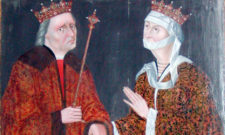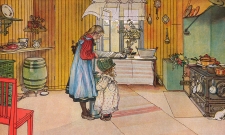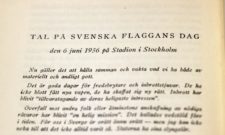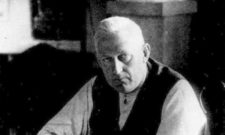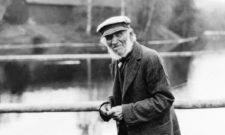Shop our historical maps
History
Vilhelm Moberg's greatest drama - the struggle against the authorities

Mar
Share on FacebookShare on WhatsAppShare on TelegramShare on X (Twitter)Föredrag av Johan Norberg, vid Vilhelm Moberg-Sällskapets årsmöte i Moshultamåla, 2014. Först tryckt i Vilhelm Moberg-Sällskapets småskrifter nr 11. Det finns inget temperament i Sverige som är så omtalat som Vilhelm Mobergs. Det finns många berättelser, en del […]
There is no temperament in Sweden that is as much talked about as Vilhelm Moberg's. There are many stories, some certainly exaggerated, some perhaps fictitious, but they are many. Sten Stolpe explained at one point:
"Vilhelm Moberg is the angriest writer our literature has ever known. He is permanently furious. There are few colleagues of his who do not keep in their hiding-places some document in which he assures them that he is their trusted enemy for all time ... If Moberg buys a farm, it must be on an island to avoid conflict with the neighbours."
But I have the impression that it was rarely a matter of some kind of instinctive urge. Once his neighbour was the electricity company, which had decided to run the wires across his property without asking him. He was angry and he fought, until they gave in. Then Moberg suddenly replied, "In that case, you can run them anywhere."
What mattered to him was the principle - the right of the individual - wires here or there didn't matter much. I think that's how we should understand Moberg's much talked about temperament.
Erland Josephson, the then director of Dramaten, has told of how he refused Moberg's The Woman's Man, and was visited by the furious author. The latter waved his arms in the air and accused Josephson of being corrupt and of stooping to accommodate the authorities. The director of the theatre said that he thought he would be beaten up, and then said gently: "I think the play is so damn bad."
Again the pattern continues. Moberg calmed down, and stated, "Well... that's one reason. That's an acceptable justification." He thanked them for the message and left.
It was a sense of justice that made Vilhelm Moberg so often charge even small matters with great importance. Some would call it a miscarriage of justice. The Social Democratic Morgon-Tidningen, which thought Moberg "should write drama - not make drama", referred to it as a kind of "Bond litigiousness".
Maybe that's not such a bad idea. Let us briefly recapitulate this litigiousness, this commitment, and then return to the question of the peasant background.
The big wake-up call for Vilhelm Moberg was the Second World War. The threat to freedom posed by totalitarian states awakened him to the great values of Western democracy. He had previously been a pacifist, but now he realised how important it was to resist evil, both ideologically and militarily.
He urged defensiveness and opposed the Swedish government's concessions to Nazi Germany in lectures and articles. In the inspiring novel of freedom Ride tonight! he portrayed 17th-century peasant Ragnar Svedje, who refuses to sacrifice his freedom and property for the German nobleman Klewen. No one could mistake the symbolism.
Above all, Moberg was horrified that Swedish freedom of the press was being curtailed for Hitler's sake. The politicians' intention was to save Sweden from being drawn into the war. But what are we to defend ourselves for if we give away all our freedom in advance? he retorted.
The war ended and Moberg thought he heard the sound of cloaks being turned in the wind. Those who had bowed south now immediately began to bow to the east. With Stalin's rise to power, the totalitarian threat remained. Moberg argued that communism was Nazism's "spiritual twin brother" and argued that Sweden should join NATO to resist the evil.
He argued that neutrality between freedom and oppression, democracy and dictatorship, was a betrayal of all human values. He criticised the Swedish government for its indifference to the dictatorship in the East, and not least he targeted his fellow writers, who largely saw the Soviet Union as an example.
When 31 leading Swedish writers paid tribute to the Soviet Union on the 30th anniversary of the revolution, Moberg pointed out that the writers did not condemn dictatorship, mass murder and repression of opinion with a single word. They did, however, praise the Soviet Union's cultural achievements, including the decline in illiteracy. But what is the point of being able to read if you can't choose what you want to read? asked an outraged Moberg.
"According to totalitarian ideology - Nazi and Communist - we human beings are the property of the state, and as state-owned beings we attain and enjoy true freedom. Our task in the total state is primarily to be citizens and useful and effective parts of a collective.
But for my part, I subscribe to the older and original interpretation of the content of the word freedom. I join with those who say that we human beings are not created to be objects of state benefit. Nothing can shake me from the conviction and belief that our life is entirely our own - that human life from cradle to grave is an end in itself."
This struggle against totalitarianism made Moberg think more deeply about what libertarian and democratic values must be defended, and he complained that many people seem to have forgotten what freedom really meant. When writers were asked to define freedom, he was not given a clear answer, instead they only offered "breakneck allegories, they told fairy tales, they talked about other things".
At worst, they spoke of freedom as a feeling of well-being, of not having to worry, of being taken care of. This played into the hands of the totalitarian forces when they said that a huge state was needed to steer people into the realm of happiness. Moberg protested:
"For my part, I would like to give the individual greater responsibility, the individual would be educated and developed into a citizen, who in the struggle of life answered for himself. But the state wants to liberate man from self-responsibility instead of developing his capacity to bear it. The state wants to take care of everything. The abstraction that we call the State is a hypocritical, immoral and false institution."
And as he added that the state lacks "a sense of lyricism".
Moberg defined freedom as the right to be free to act as one wishes, as long as one does not violate the equal freedom of others. The individual has the right to go his or her own way, regardless of what the collective thinks. Moberg used this concept of freedom to turn his attention to the Swedish state apparatus. Among other things, he objected to the registration of opinions, including those of communists, because, as he put it, one of the differences between communists and democrats was that the latter give freedom of opinion even to their opponents.
The state television and radio monopoly was another of Moberg's targets. He had seen how the authorities were not always to be trusted and argued that the monopoly gave them a dangerously privileged position in the media landscape. With similar arguments, he targeted the state church. Sweden cannot believe in God and should not favour one faith over another.
If Western democratic principles were taken seriously, it was impossible to advocate monarchy, Moberg argued. Allowing the position of head of state to be appointed by breeding rather than election and protecting the king from prosecution violated equality before the law. All Swedes must formally have the same chance to reach the highest position in the land. He was particularly annoyed that most people sensibly agreed with him that a republic and clear separation of powers would be best, but that they then went out of their way to escape their own conclusions with limp emotional arguments.
The judicial scandals should be read from this perspective. It is easy to get caught up in the details of Kejne, Haijby and the others, but it is still a little unclear what happened in the various affairs, and Dan Korn recently showed with the book Kejne : the reality behind the 1950s legal red tape that many of the theories Moberg had - and which many, including yours truly, have believed - were not consistent with what we now know. And to understand Moberg's commitment, it is not the particulars and theories that are important, but the principled basis on which he entered the fray.
We know that very well. He argued that the Swedish state had grown so large and the corruption of cronyism in politics and government was so widespread that there was a threat to the sanctity of the individual. In the Sweden that was being built in the post-war period, citizens had a strong position only if they belonged to a well-established organisation, but this risked the individual being "organised to death" and Moberg had to act as the representative of the vulnerable individuals:
"The ladder of freedom in the Swedish society of regulation and direction is shrinking under our feet and becoming narrower. The great problem of our time, which we experience every day in a concrete and tangible way, is the contradiction between the citizen and society, between the individual and the collective, between the organisations and the unorganised, the struggle between man and his own creations. In every area of our daily lives we encounter the tentacles of the state, a creeping influence, a more or less perceptible control over our actions. The state tries to bring us under its sway - like Amman putting the straitjacket on the Master of the Horse in the final scene of Strindberg's Fadren."
But it's after such a quick summary that we suddenly recognize ourselves, isn't it? It is now that we must stop and ask ourselves whether we have not seen traces of this commitment to individual rights long before, long before Moberg started debating and lecturing and writing articles. His fiction abounds with references to individuals going their own way because they cannot accept the public lie or collective pressure.
In A P Rosell, Bank Manager from 1932, Rosell speaks disappointedly about his childhood friend who cannot accept lying for the greater good:
"He was not able to work off peasant egoism... Such people ... can make no sacrifices for the ideals of the future. Narrow-breasted individualists."
In Man's woman the year after, Håkan thinks:
"Is he not of the family of the acquitted? ...A man leaves the cramped, fenced-in life of the village to become a forest ranger. Because he cannot bear the coercion of the many, because he has not accepted their custom and inherited way of life, because he will not obey the decisions of the voice of the many.
There have been such men in the past, and in all ages one or two are born."
And in Soldier with broken rifle In 1944, Editor Fläderbaum lectures Valter Sträng:
"- You do not understand the demands of socialism for loyalty and solidarity: that the freedom of the individual must be limited in order to guarantee the freedom of the masses!
- But if the freedom of all individuals is restricted, how can the masses be free? After all, it consists of all the individuals.
- You should be a farmer's lawyer."
Despite this Morning paper there is no sharp line between writing drama and making drama. Literature can take its motifs from reality and it can in turn illuminate it and inspire it. Moberg once remarked that "poetry is only the clearer truth that one lies one's way to when one tells it".
His fictional themes recur very clearly in his little preparedness writing Swedish aspiration from 1941, which talks about how Swedes have been shaped by the challenges of the landscape and the rush of the forest. According to Moberg, we have the climate that forces inner strength and encourages diligence. The sparse population meant that Swedes could not count on the help of others, but helped themselves. That's how independence and a thirst for freedom are created. It is this hard-working and striving people, mainly the peasants, who in Sweden have never been enslaved by the yoke of feudalism, not the king and the nobility, who are our true ancestors.
It is precisely from this perspective that he would later write My Swedish history, a story that for Moberg was driven by struggle and struggle, between the authorities and the people. A Swedish history that begins with the tens of thousands of Swedes who lived as serfs in early 11th century Sweden. In a more playful passage, he recounts one of our earliest myths: that all citizens of ancient Svitjod who had a nose for this reason paid a nose tax to King Odin.
The struggle between power and men has been going on throughout the ages. In certain periods, the people have gained or gained freedom, and then the land has been cultivated, natural resources have been exploited and machines have begun to run. But there have been periods when those in power and the state have gained the upper hand, and the people have suffered unpaid day labour and cruel wars. Power does not create anything itself, but is purely parasitic, it lives off the people's work, puts obstacles and problems in the way of the Swedes. It often oppresses the citizens.
In a sense, it is a paradoxical view: Sweden has both the most freedom-loving peasant descendants, but also a shameless supremacy. During the war, Moberg wanted to foster defensiveness and national pride, so it was natural to focus on what was good and important in Sweden. After the war, he wanted instead to harness the will to change and social criticism, which is why it became more interesting to point out the negative. During longer periods abroad, he also gained a new distance from Sweden, not least when he felt rejected and betrayed by his homeland and his native country.
Sweden was entering a new period of supremacy. The space for freedom was shrinking as the state spread its tentacles and the individual risked being organised to death. In his 1947 article "The Narrow Gap of Swedish Freedom", Moberg argued that Sweden was divided into two groups, the controlled and the controlling. The former were the working people in agriculture, industry and commerce who created wealth and development for the whole country, but whose work was hindered and obstructed by bureaucrats and controllers. These do not carry out independent productive work, but they:
"regulates and directs and orders and decrees and enjoins and prescribes and establishes and regulates again".
They endangered freedom and also threatened the economy, as fewer and fewer people had to provide for more and more people, constrained by more and more regulations and prohibitions. It is the age-old struggle between the lords and the people that Moberg saw around him once again. Once again, the bailiffs stood against the peasants. Moberg pointed out with cynical delight that Gunnar Sträng admired Gustav Vasa.
This paradoxical view of Sweden is brought to a head in the four novels of The Emigrant Epic (1949-1959). The group of emigrants, headed by Karl-Oskar, exemplifies Moberg's ideal of Swedishness. They are full of energy, a sense of justice, a zest for life and love - but this only makes them long for Sweden.
When the brig Charlotta leaves Karlshamn on a misty April day, a number of emigrants gather at the stern to see their homeland one last time. It's the kind of scene made for nostalgia and melancholy, but Moberg's emigrants think only of what they'll be missing: the dull gentleman, the heavy treasures, the snotty priest, the moralizing, suffocating home town.
The Emigrant Novels is one of the greatest classics of Swedish literature, and has sometimes been called a national epic. But in this case it is a national epic about a homeland so inhospitable that you have to cross oceans to find room to grow:
"For them, life began anew: they had to rely entirely on themselves and use their strength freely. They broke the power of old customs, did their own business in their own way, and obeyed no will but their own. Here it was left to themselves to provide a government: in the wilderness they fully enjoyed the new freedom of their disobedience.
And here no one knew class or status, here no one had inherited prerogatives or rights, no one was superior or inferior by birth. Each was valued according to his ability and measured by the yardstick of ability. Whether a man was superior or inferior was determined by what he could do. The forests of the settlers encouraged self-reliance and raised free men."
Here is an incipient crack in Moberg's picture of Sweden. The Swedes are still great, but Sweden is "an old and backward country with unjust laws, written by the masters for the simple folk". For the emigrants to come into their own, they must go to America and recreate something of what has been lost in the old world. It is not only the astrakhan that is being replanted in new soil. In America, the space and distance from power that laid the foundations for the Swedish endeavour is regained. Moberg felt the same way during his time in the United States, declaring that he wished he had been born in California and had been allowed to live his life there.
Jens Liljestrand has written a brilliant treatise on the emigrant epic that I am happy to recommend, Mobergland. There he writes that it can be interpreted as a Cold War novel - the America of freedom and the oppressive Europe becomes in this reading a metaphor for the struggle between the West and the Soviet Empire. It is a possible reading, and Liljestrand shows that there are such underpinnings. But I would still like to turn it around a bit: I don't think Moberg is reading the Cold War into the 19th century Swedish conflict between sovereign and subjects, I think Moberg is reading the 19th century - and for that matter the 17th, 16th, 15th, and 15th centuries - Swedish conflict between sovereign and subjects into the Cold War and other modern conflicts. It is with a historical and locally rooted concept of freedom that he reads the modern world.
And thus the circle is closed.
And it ends right here, in Småland, in Moshultamåla. For it was here, in these woods, that Moberg was brought up, and he himself wrote in Stories from my life that as a child he was raised by forests, to understand that the natural thing was to take care of itself, that this is how everything starts and that everything else was artificial, an imposition, which one does not have to stand up to, which one has to fight:
"In front of no one I could behave as I wanted, I could shout and scream as loud as I wanted, I could lie down on the moss and kick and hit somersaults, no one cared about that. Whatever I made up, I wasn't reprimanded. I had only trees and bushes around me and they did not banish me no matter how madly I acted; I only heard the gentle rustle of pines and spruces over my head and it sounded like a caress.
I felt as if the tall trees were protecting me and defending my right to advise myself and behave as I saw fit. At home and at school there was always something called good and bad behaviour, but there was no such thing anywhere in the woods. The child's awakening need for freedom found expression in a life in the woods, a need that became more pressing as I grew older."
Subscribe to YouTube:
If you appreciate Allmogens independent work to portray our fine Swedish history and Nordic culture, you are welcome to buy something nice in the shop or support us with a voluntary donation. Thank you in advance!
Support Allmogens via Swish: 123 258 97 29
Support Allmogens by becoming a member
Support Allmogens in your will
